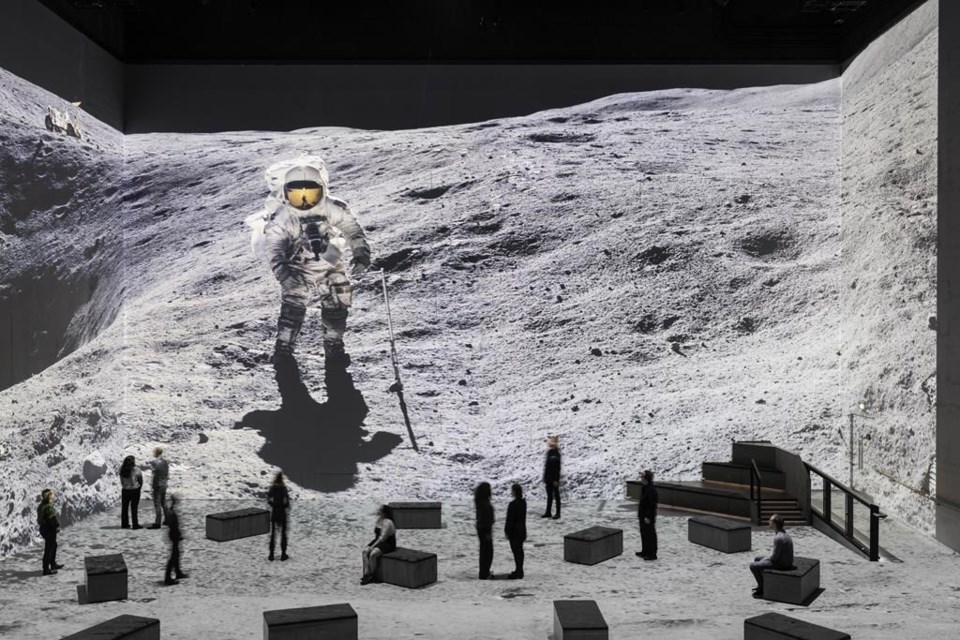LONDON (AP) â You wonât see Tom Hanks on one of those flights that whisk celebrities and millionaires on a suborbital jaunt for a few hours. He says it wouldnât be enough time out of this world.
âI donât need to go up and down,â Hanks said Tuesday. âI think Iâd need a little bit longer in paradise.â
Going to the moon is another matter â and the subject of âThe Moonwalkers,â an immersive documentary co-written and narrated by Hanks.
âIâd do that in a second,â Hanks said. âI donât have the math. I do not have those abilities, but Iâm sure thereâs something I could do in order to help the program.â
The two-time Academy Award-winning actor is a lifelong space buff, and he has channeled his passion into âThe Moonwalkers,â which opens Wednesday at the Lightroom, a London venue specializing in interactive art and film experiences.
Visitors sit on benches surrounded by imagery as the 50-minute film brings NASAâs Apollo space missions to life. The focus is on the 12 men who walked on the moon between 1969 and 1972, the thousands of people who helped them get there and set to return to the moon as part of the Artemis program.
Itâs a high-tech blend of archive film footage, drawings, animation and digitally remastered photographs â but not, Hanks stresses, any computer-generated images.
âEvery photograph, every image was a photograph taken by a human of the subject,â Hanks told The Associated Press as he sat in the venue in front of a giant lunar landscape. âSo thereâs nothing fake.â
âThe Moonwalkers,â which runs to April 21, 2024, is subtitled âa journey with Tom Hanks.â The actor narrates in his warm, avuncular style and co-wrote the script with British documentary filmmaker Christopher Riley.
The space race is presented as a deeply humanist endeavor that represents humanityâs unquenchable curiosity and desire to do things â as President John F. Kennedy said of the moonshot â ânot because they are easy but because they are hard.â
Hanks, 67, has been enthralled by lunar exploration since he was a kid trying to simulate zero gravity by sitting at the bottom of a backyard swimming pool. His performance as Jim Lovell, commander of a space mission in jeopardy, in âApollo 13â helped revive popular interest in the Apollo program in the 1990s.
Perhaps the signs were there early on that heâd become an actor, not an astronaut. What hooked Hanks on space was not so much the cutting-edge science as the human drama. His interest is in the people up there.
âThe science is cool, when you can grasp what the science is, but the science always goes hand in hand with, you know -- Do they drink coffee up there? Do they have hot water? Do they need a shave?â
Hanks said the first time he was entranced by space was as a 12-year-old in 1968, seeing an image on his TV of the Earth beamed live from the Apollo 8 spacecraft orbiting the moon.
âIt was a live broadcast, and you could see the cloud, you could see the gray of the ocean, you could see the darker gray of the land,â he said, recalling his amazement that he was seeing âthis great sagaâ on the same TV he used to watch âBatmanâ and John Wayne movies.
âI didnât view it as politics. I didnât view it as news. I viewed it as something that was like a great adventure out of Jason and the Argonauts ⊠a storytelling artistic achievement equal to all of the technological brilliance.â
âThe Moonwalkersâ includes interviews with the four astronauts due to join the Artemis II mission, humanityâs first foray moonward in half a century.
Reid Wiseman, Victor Glover, Christina Koch and Jeremy Hansen are due to fly NASAâs Orion capsule on the first crewed Artemis mission, launching from Kennedy Space Center no earlier than late 2024. They will not land, but will fly around the moon and head back to Earth, a prelude to a lunar landing by two others a year later.
Countries including and also have plans to take astronauts to the moon.
Consummate team players, the Artemis crew members say they would be thrilled by the new lunar program even if they had not been selected for the mission.
âI would be just as excited to watch at home in my pajamas,â said Glover, who will be NASAâs first African American lunar astronaut. âItâs just amazing that weâre sending humans back to the moon.â
Koch, the first woman to go on a moon mission, said Artemis is the start of a journey that will lead humans â some years from now â to Mars.
âI think we will go to Mars because we can answer one of the most fundamental questions that we all have there, which is, are we alone?â she said. âEverywhere I go, people ask me that question and what we think about that question. Weâre going to go there because our best chance of knowing the answer to that is there.â
Jill Lawless, The Associated Press



